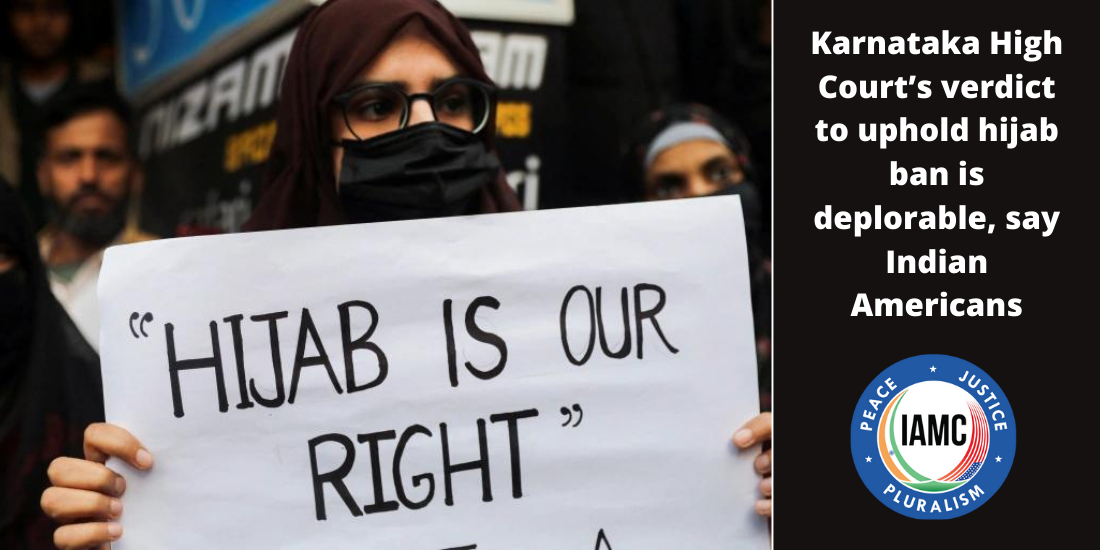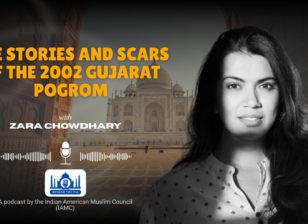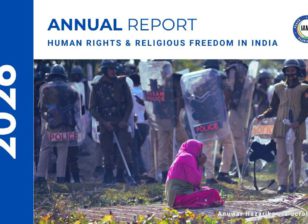Karnataka High Court’s verdict to uphold hijab ban is deplorable, say Indian Americans
FOR IMMEDIATE RELEASE
Washington, DC (March 15, 2022) – The Indian American Muslim Council (IAMC), an advocacy group dedicated to safeguarding India’s pluralist and tolerant ethos, today strongly and unequivocally condemned the Karnataka High Court’s verdict to uphold the discriminatory ban on hijabs in schools, which has been affecting students since December 2021. The court’s reasoning for upholding the ban was based on the interpretation that hijab is not an essential practice in Islam. The court also upheld a Karnataka government order stating that uniforms must be worn where policies exist, and that no exceptions should be given for the hijab.
“There is no evidence that the petitioners chose to wear their headscarf as a means of conveying any thought or belief on their part or as a means of symbolic expression… It can hardly be argued that hijab being a matter of attire, can be justifiably treated as fundamental to Islamic faith,” the court stated in its verdict.
However, the role of the Indian judiciary is not to interpret religious texts; nor is it qualified to pass judgment on the petitioners’ intentions for wearing the hijab. The role of the court is simply, to uphold the rights of the Indian people based upon the pluralistic and secular values inscribed in the Constitution.
The court further claimed that the hijab ban falls under the prescription of school uniform, which “is only a reasonable restriction that is constitutionally permissible which the students cannot object to.” This logic not only singles out the hijab in a blatantly discriminatory manner, but also conflicts with Article 21 of the Constitution, which guarantees the right to privacy, including through clothing.
The court defended the hijab ban imposed by schools as a protection against “divisive lines,” arguing that it cannot be “gainfully argued that prescription of dress code offends students’ fundamental right to expression or their autonomy.”
The implication that hijab is a “divisive” symbol runs contrary to India’s post-Independence history, where not only hijab but other religious garments such as the turban, mangalsutra, sindoor and bindi were – and still are – considered non-issues and freely worn by people of the respective faiths in all sectors of society, including educational institutions. What is truly divisive is not the innocuous hijab or any other religious attire, but the anti-Muslim hate speech, lynchings and discriminatory policies that are being normalized by the Rashtriya Swayamsevak Sangh and its affiliates including the ruling Bharatiya Janata Party. The court’s decision to side with Islamophobic bigotry only exacerbates the divisions.
Lastly, the court claimed that “some ‘unseen hands’ are at work to engineer social unrest and disharmony,” echoing rhetoric used by the BJP to suggest that the Muslim students who have been harassed, threatened, and doxxed for seeking their constitutional rights are part of a greater plot to destabilize India. This ludicrous statement is based on the bizarre idea that 200 millions Muslim citizens of India are a dangerous “other” and somehow pose a threat to Hindu society. The judiciary perpetuating such myths increases the risk of further anti-Muslim violence and persecution.
“By attacking Muslim women’s freedoms, Hindutva forces have found a quick and cheap means of demoralizing and invisibilizing the Muslim identity in India,” said Dr. Samina Salim, Associate Professor at University of Houston. “The argument is to ‘liberate’ women from ‘regressive’ customs, but at the same time, their freedom is encroached by telling these women what they can or cannot wear, while also denying them the freedom to practice their faith and the right to seek education,” added Dr. Salim.
“It is not the place of the High Court, or any government institution in a secular democracy to regulate women’s attire,” said Mr. Rasheed Ahmed, Executive Director of IAMC. “Moreover, it is deplorable for the judiciary to flaunt such blatant support for an extremist ideology over the text of the Constitution itself. Whether or not hijab is an essential practice of Islam is not the issue at stake. The issue is that Muslim women who freely choose to wear the hijab, and are proud to do so, are being told to choose between their clothing and their education. The Karnataka High Court has sided with those who wish to bar scores of marginalized women from education or alter their garments by upholding a discriminatory stance that singles out hijab as a religious garment.”
This has set a dangerous precedent for the treatment of Muslim women all over India. As student activist Afreen Fatima put it, this verdict judicially sanctions apartheid and has the potential to embolden Hindutva fanatics to further harass and demean Muslim women in schools and public spaces.
IAMC has called upon the Indian Supreme Court to uphold the sanctity of the Indian Constitution and reverse the decision of those attempting to create division in society and further marginalize an already vulnerable group. IAMC has also urged civil society groups to stand in solidarity with the Muslim students who have been affected by this decision.




